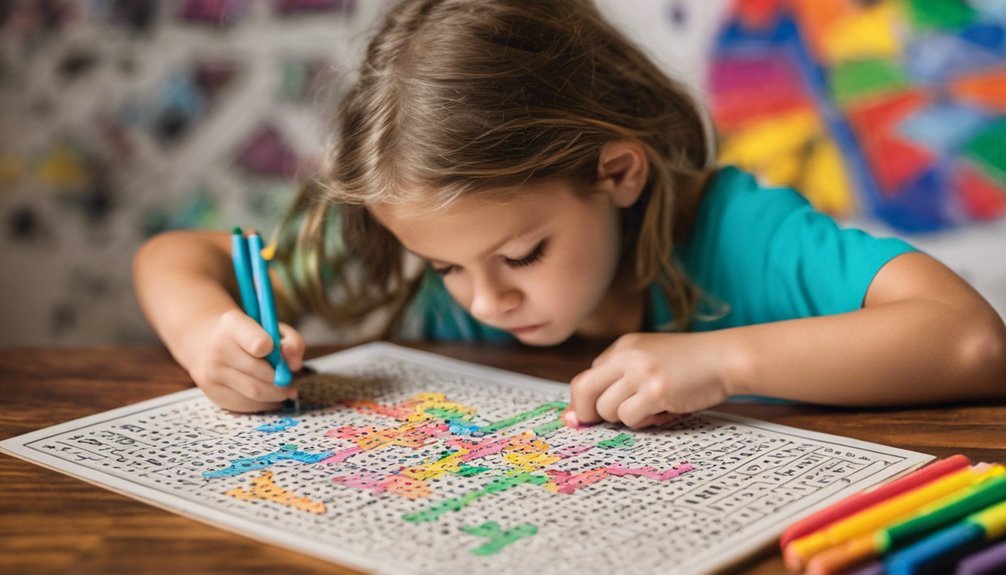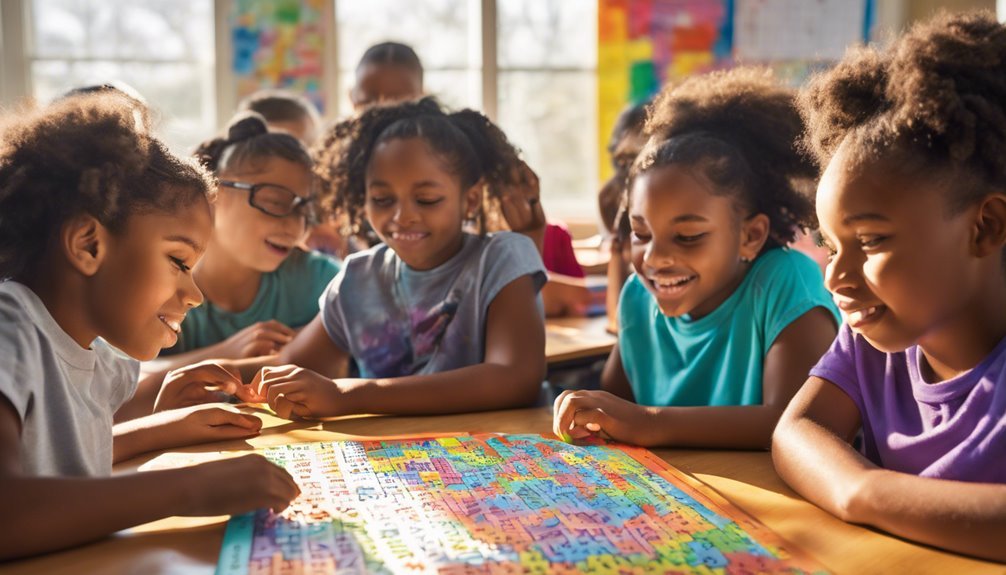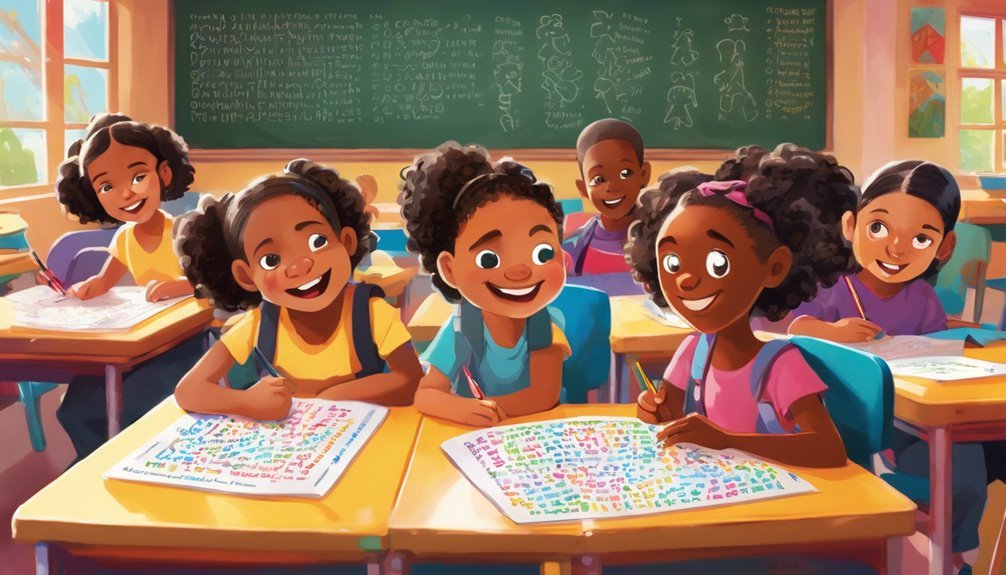Word search puzzles can significantly enhance your child's early writing skills in various ways. As they hunt for words, they're not just having fun; they're actively engaging with language, which reinforces their vocabulary and spelling. This interactive approach not only sharpens their cognitive abilities but also builds their confidence as budding writers. You might be surprised at the deeper impacts these puzzles have on their literacy development and overall learning experience. What exactly are these benefits?
Key Takeaways
- Word search puzzles enhance vocabulary by exposing children to new words, aiding their comprehension and expressive abilities in writing.
- Visual engagement in word searches reinforces spelling skills through repetition, contributing to accurate spelling in their writing.
- Solving puzzles boosts cognitive skills, promoting critical thinking and problem-solving, which are essential for effective writing.
- Recognizing patterns in word searches improves literacy skills, aiding in letter formation and text navigation necessary for writing.
- Completing puzzles builds confidence in children, encouraging them to express their ideas freely and experiment with their writing style.
The Role of Vocabulary in Writing Development
Vocabulary plays a crucial role in developing strong writing skills in children. As you encourage vocabulary expansion, you're not just adding words; you're enhancing their language comprehension.
A rich vocabulary allows children to express themselves more precisely and creatively. When they encounter new words in context—like during word search puzzles—they're better able to grasp their meanings and uses.
This active engagement with language fosters a deeper understanding, enabling them to construct more sophisticated sentences. As they grow comfortable with diverse vocabulary, their writing becomes more vivid and engaging.
You play an essential role in this process, guiding them to explore new words and encouraging them to integrate these discoveries into their writing. Ultimately, this lays a solid foundation for their future communication skills.
Enhancing Spelling Skills Through Engagement
While children engage in word search puzzles, they inadvertently strengthen their spelling skills. This activity fosters visual engagement, allowing them to connect letters with words in a dynamic way.
As they actively search for terms, they become more familiar with correct spellings, reinforcing their understanding through repetition. Interactive learning is at play here; every puzzle provides immediate feedback as they identify and circle words, enhancing retention.
The challenge of finding words can motivate children to pay closer attention to spelling patterns, making it an enjoyable way to develop a critical skill. By incorporating word searches into their routine, you're not just offering entertainment; you're creating an environment where spelling mastery can flourish through focused, engaging practice.
Cognitive Benefits of Solving Word Searches

Engaging in word search puzzles not only boosts spelling skills but also offers significant cognitive benefits.
These puzzles enhance your ability to make word associations, which is essential for language development. As you search for words, your brain actively connects letters and meanings, strengthening neural pathways. This process enhances memory retention, allowing you to recall vocabulary more effectively in future writing tasks.
By regularly solving word searches, you're not just having fun; you're training your brain to think critically and creatively. This cognitive engagement promotes problem-solving skills and boosts overall mental agility.
Consequently, integrating word searches into your learning routine can provide a robust foundation for mastering language and writing proficiency.
Pattern Recognition and Its Impact on Literacy
Recognizing patterns is a fundamental skill that significantly influences literacy development, particularly in young learners. When you engage with word search puzzles, you enhance your ability to identify letter formations and sequences, which is crucial for reading and writing.
This skill fosters visual tracking, allowing children to navigate lines of text more efficiently. By repeatedly locating words within a grid, kids sharpen their focus and improve their spatial awareness, both essential for mastering letter formation.
As they connect letters to familiar words, they build a foundation for phonemic awareness, making it easier to decode new vocabulary. Ultimately, these experiences contribute to a deeper understanding of language, setting the stage for more advanced literacy skills as they progress.
Boosting Confidence and Motivation in Young Writers

As children immerse themselves in word search puzzles, they often experience a boost in confidence and motivation that can translate directly to their writing efforts. Completing these puzzles serves as a rewarding accomplishment, reinforcing their belief in their abilities.
This newfound confidence encourages them to engage in self-expression exercises, allowing them to explore their thoughts and ideas more freely. Moreover, the vocabulary they encounter in word searches enhances their language skills, providing them with a richer toolkit for creative writing.
As they tackle new words and phrases, they become more eager to experiment with their writing style. Ultimately, the joy of discovering words in puzzles fosters a passion for writing, empowering them to express themselves authentically and creatively.
Encouraging Critical Thinking and Problem-Solving
Word search puzzles serve as an excellent tool for nurturing critical thinking and problem-solving skills in children. When kids engage with these puzzles, they exercise creative reasoning by deciphering patterns and relationships between letters.
This process enhances their analytical skills as they learn to approach challenges methodically, identifying potential solutions hidden within the grid. As they sift through letters and words, they're not just searching; they're strategizing.
This active engagement encourages them to think critically about how to locate words efficiently, fostering a mindset that values persistence and adaptability. By consistently tackling these puzzles, children develop a stronger foundation for tackling more complex problems, setting the stage for advanced cognitive skills that will benefit them throughout their academic journey.
Incorporating Word Searches Into Daily Learning Activities

Incorporating word searches into daily learning activities offers a fun and interactive way to reinforce vocabulary and spelling skills. By fostering creative integration, you can enhance your child's educational experience.
Consider these strategies:
- Theme-Based Word Searches: Create puzzles around subjects like science or history to contextualize vocabulary.
- Daily Challenges: Introduce a word search each day to make learning a routine.
- Group Activities: Encourage collaborative puzzles with friends or family to promote social learning.
- Reflection Sessions: After completing a search, discuss the words found to deepen understanding.
These approaches not only make interactive learning enjoyable but also help develop your child's writing skills, setting a strong foundation for future literacy.
Frequently Asked Questions
How Often Should Children Practice Word Search Puzzles?
To optimize children's engagement with word search puzzles, aim for a frequency of three to four sessions per week.
Each session should last around 15 to 20 minutes, which is ideal for maintaining focus and enthusiasm.
This balanced approach promotes cognitive development without overwhelming them.
What Age Is Appropriate to Start Word Searches?
You can start introducing word searches to children around age 4, coinciding with preschool readiness.
At this age, their cognitive development is primed for recognizing patterns and letters, making it an ideal time to engage them.
By incorporating word searches into their activities, you'll not only enhance their vocabulary but also support their critical thinking skills.
Just ensure the puzzles are age-appropriate to keep them motivated and challenged without feeling overwhelmed.
Can Word Searches Improve Handwriting Skills?
Yes, word searches can improve handwriting skills. As you trace and circle letters, you engage fine motor skills crucial for writing.
This repetitive movement helps strengthen the small muscles in your hands, leading to better control and coordination.
You'll notice that as your fine motor skills develop, your handwriting becomes neater and more legible.
Are There Specific Themes for Educational Word Searches?
When it comes to educational word searches, the sky's the limit in terms of themes. You can explore animal themes, diving into the world of wildlife, or celebrate special occasions with holiday themes.
Each theme not only makes the puzzles more engaging but also enhances learning by connecting vocabulary to familiar contexts. By choosing specific themes, you tap into students' interests, making the educational experience more enriching and enjoyable for everyone involved.
How Can Parents Create Their Own Word Searches?
Creating your own custom word searches can be a fun and rewarding activity. Start by selecting a theme that resonates with your child's interests and build engaging vocabulary around it.
Use an online generator or create a grid on paper, filling it with words horizontally, vertically, and diagonally. Don't forget to include a word bank for easy reference.
This hands-on approach not only entertains but also fosters a deeper connection with language and learning.
Conclusion
Incorporating word search puzzles into your child's routine can significantly enhance their writing skills. Research suggests that engaging with vocabulary in a playful context not only reinforces spelling but also fosters cognitive development. As they navigate through the puzzle, kids sharpen their focus and critical thinking, making the learning process enjoyable. So, the next time you hand your child a word search, remember: you're not just offering a game; you're nurturing a budding writer with every word they uncover.




